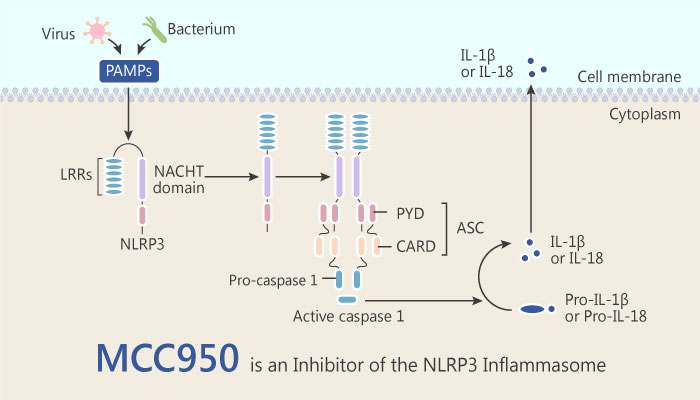NLRP3 (NACHT, LRR and PYD domains-containing protein 3) is a component of inflammasome, expressed mainly in macrophages. It reports products of injured cells like extracellular ATP and crystalline uric acid. Activation of NLRP3 exerts an immune response.
Activated NLRP3 binds to ASC (apoptosis-associated specklike protein containing a CARD). Then, ASC interacts with caspase-1 to form the inflammasome. Subsequently, caspase-1 is activated, and cleaves IL-1β and IL-18 to active forms.
However, mutant NLRP3 genes may cause a lot of autoimmune disorders. It is in need to find out more NLRP3 inhibitors to treat these dieseas.
Rebecca C Coll, et al discovered a small compound, MCC950, as a potent NLRP3 inflammasone inhibitor. They carried out a series of assays to prove its bioactivity.

To detect the effect of MCC950 on NLRP3 activation, they choose two kinds of cells. They are BMDMs and HMDMs (mouse bone marrow–derived macrophages, human monocyte–derived macrophages). As a result, MCC950 specifically inhibits IL-1β secretion, with IC50s of 7.5 nM and 8.1 nM in BMDMs and HMDMs, respectively.
In particular, MCC950 shows no inhibitory effect on activation of other inflammasome complexes, such as NLRC4, AIM2, NLRP3 priming or Toll-like receptor. MCC950 suppresses NLRP3-induced ASC oligomerization instead of K+ efflux, Ca2+ flux or NLRP3–ASC interactions.
In addition, MCC950 exhibits potent activity against NLRP3, reduces EAE in the in vivo experiments.
Summarily, MCC950 is a potent and selective inhibitor of NLRP3. It has potential in the therapy of autoimmune diseases.
References:
1. Coll RC, et al. Nat Med. 2015 Mar;21(3):248-55.